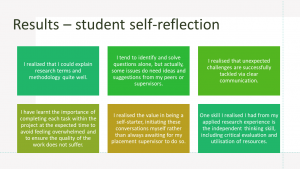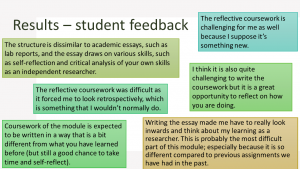Author: Jennifer A. L. McGowan
jennifer.a.l.mcgowan@ucl.ac.uk
Abstract
As well as academic success, we pride ourselves at UCL on providing opportunities for students to learn soft skills (management, communication, leadership etc.) that will be of benefit to them in attaining and succeeding in the occupational world after their degree is over. However students often are not provided with opportunities to reflect on the skills that they have learned, or to practise vocalising these skills.
We changed our assessment for one skills-based module this year from an academic essay to a self-reflection on 1) a personal difficulty, and 2) personal skills developed during their research project. Students not only reported astounding levels of self-reflection, but that they appreciated the opportunity to reflect on their growth and to write a non-academic piece. Student reported being more confident in their skills following this assignment (as assessed by external focus group).
Introduction
Transferable (“soft”) skills can be defined as “A set of socio-affective skills that are necessary for interaction with others and that make it possible to cope with everyday demands and challenging situations” (World Health Organization, 2003). They include interpersonal skills (assertive communication, building healthy relationships, negotiation, cooperation and empathy), and cognitive skills (problem-solving, decision-making, critical thinking, self-evaluation). Transferable skills are key to personal development, work, and employment (Kechagias, 2011), and closely related to personal well-being, social adjustment, and adaptation to the work context (Raciti, 2015). The World Health Organization global school health initiative, has recognized soft skills as a priority mental health promotion strategy (Ippolito-Shepherd & Cerqueira, 2003). In a setting where everyone is academically qualified, transferable skills will enable easier employment and faster career progression. As such transferable skills are key outcomes across courses at UCL, and much effort is made to integrate them into the learning experiences.
However, although university graduates report being competent in these transferable skills, employers still regularly report that these key skills are missing (Noah & Aziz, 2020). While we are confident that were are providing these skills, it is possible that students are either unaware of this skills development, or unable to adequately evaluate their skills. Without the ability to confidently recognise and articulate their skills development, students will not be able to describe their experience to potential employers, nor to recognise where they may require further support and growth (Guerra-Báez, 2019).
We developed a systematic assignment which required students to assess their level of soft skills, strengths or weaknesses such that they could recognise, and commit to, personal development. We were unable to find previous literature on this specific idea – and it may not yet exist. However by doing so we aimed to:
- Provide an opportunity for students to identify their skills and achievements.
- Develop critical thinking and analysis, allowing them to direct their development.
- Provide the opportunity to practise writing for employment.
- Provide an opportunity for staff to assess student skills.
- Identify skills being developed during the module.
The outcomes of this experiment were assessed via student feedback and independent student reviewers.
Methods
This case study occured within a module on ‘applied research methods’, which coincides with student fourth year dissertation placements with external organisations. It may need to be adapted for use in other environments.
We changed our assessment from an 1,500 word academic essay to a 1,500 word self-reflection on:
- A personal difficulty,
- Personal skills developed during their research project.
Students were told that:
“The aim of this coursework is to allow you time for self-reflection on the skills that you have developed as an independent researcher, and display them in a way that will be of use to you when applying for occupational positions in the future. This coursework reviews not only your understanding of the considerations necessary in applied research, but also your critical analysis of yourself and your own applied research ability.”
They were provided with a description of the assessment’s aims, intended learning outcomes, and a summary of what information should be included in each section. They were also provided with a marking sheet, describing the expected grade for each output. These resources are available upon request, and a brief example is given in the table below.
Table 1., A brief summary of the description given to students of the required information in each section of the essay. A longer version was given to the students and is available upon request.
| Applied research project
(600 words) |
-Write a very brief introduction providing your research question and your reasoning for applying the given method to answer it. Argue why the methodology you chose is particularly suited to answering this question. Indicate how your research question relates to the wider field / your research project. |
| Applied research experience
(600 words) |
-Provide a detailed description of one challenge that you experienced during the development of your placement. This could be something that went wrong, a change you had to make to your methodology, a difficult interaction, a limitation that you came into contact with when working with others – or to others time-tables, or a change to the time-line.
-Describe how you overcame the challenge, and what you learned from it. |
| Self-reflection
(300 words) |
-Comment on the value of your experience. What did you learn from this experience about how applied research takes place? What considerations do you now know about that you didn’t previously? What skill do you now realise that you have, or need to develop further (e.g. communication, organisation, planning)?
-Must include a self-reflective commentary on your performance (describe areas of improvement, what you would do differently or more proactively in the future). |
The assessment was graded, and worth 70% of the final grade for this module. This was chosen to require students to participate in this opportunity and to assess their progress. This was expected to have a greater impact than an optional activity, which was likely to have lower uptake.
Results
Students, although initially concerned about this new form of assessment, demonstrated high capacity for self-reflections. They provided insightful feedback both on their experiences of working with an external organisation, and on their current (and still needed) skills development. Many of the skills developed were the ones that we had hoped we were encouraging in students, and so it was also helpful to see what students believed that they were, and were not, learning. Example of the skills identified are given below.

Students reported finding this assessment very difficult and different to their usual academic writing. There was a shift in thinking required to develop this new writing style, and some students struggled to articulate their experiences. This demonstrates how new this skill was to the students, and therefore how new it may be to our graduates when applying for post-graduate positions. Although students reported difficulty, grades were very high, with all students attaining a 2.1 or higher.
Student feedback following the activity showed that students felt that the activity contributed to their understanding of their dissertation projects, that they enjoyed writing it and even though it was hard they enjoyed the challenge of it being different, and that they thought it was a valuable coursework – and would actually want to repeat it later when they are more into their projects as they thought it was a good opportunity to reflect on their report. Student feedback is provided in the image below.

The independent reviewers similarly reported that:
“The assignment is very engaging. I love how it was related to what they’re doing (they loved this aspect too). I would enjoy spending a lot of time on this assignment especially as it helps with the overall final dissertation and helps to identify where you can improve. I liked that there were three clear sections … so you can really cover the breadth of the research and reflect fully. And I appreciate its function too which can build the foundation to further study and make a reflection to research. It is really a meaningful process itself.”
Summary
In summary, we found that by providing students with a standardised opportunity to reflect on thier personal learning we were able to develop student’s self-evaluation of transferable skills in a way that they may find helpful post-degree. Students reported high levels of self-reflection, and appreciated the opportunity to reflect on their growth and to write a non-academic piece. They also reported being more confident in their skills following this assignment (as assessed by external focus group).
This activity supports the wide range of skills development activities currently available to students at UCL and builds upon it. It replaces an existing assessment, and so requires no further work-load from staff and yet has a positive student impact. We recommend this method to courses concerned about their student’s development.
Key references
¬Guerra-Báez, S. P. (2019). A panoramic review of soft skills training in university students. Psicologia Escolar e Educacional, 23.
¬World Health Organization(2003). Skills for Health Disponible: http://www.who.int/school_youth_health/media/en/sch_skills4health_03.pdf
» http://www.who.int/school_youth_health/media/en/sch_skills4health_03.pdf
¬Gruzdev, M. V., Kuznetsova, I. V., Tarkhanova, I. Y., & Kazakova, E. I. (2018). University Graduates’ Soft Skills: The Employers’ Opinion. European journal of contemporary education, 7(4), 690-698.
¬Noah, J. B., & Aziz, A. A. (2020). A Systematic review on soft skills development among university graduates. EDUCATUM Journal of Social Sciences, 6(1), 43-58.